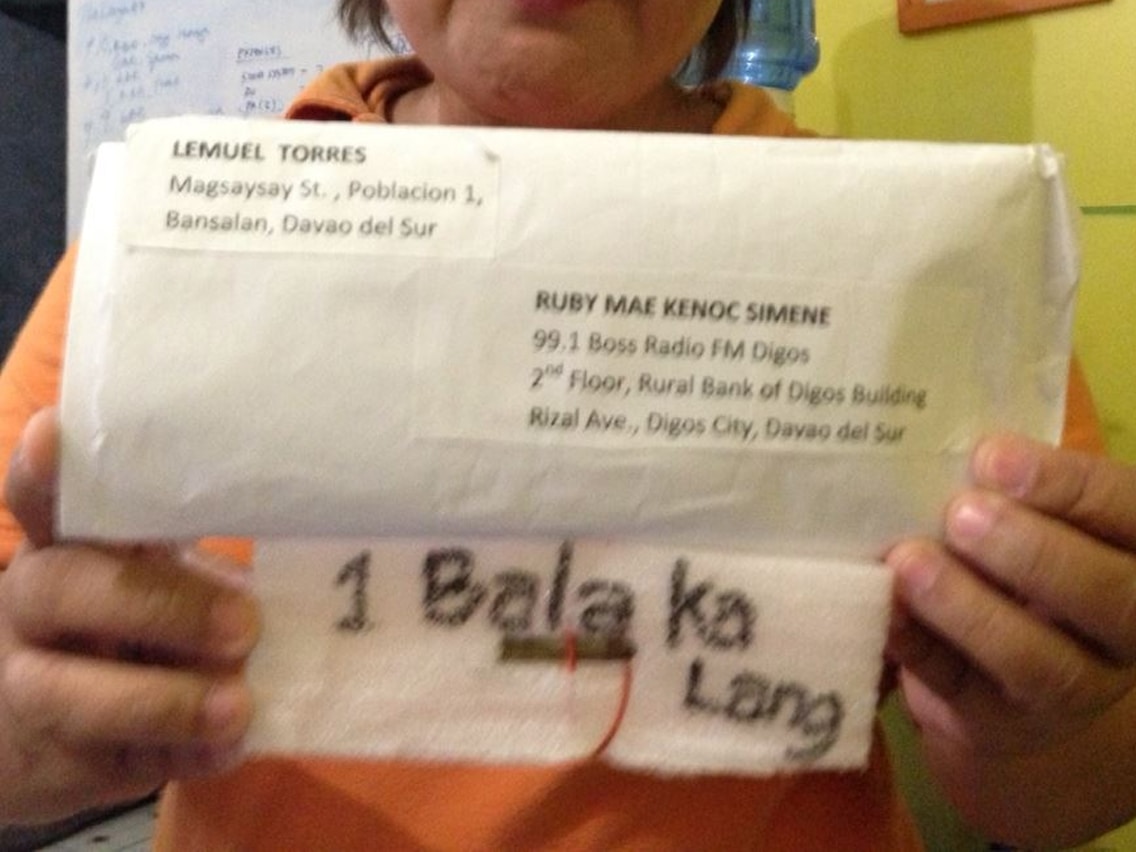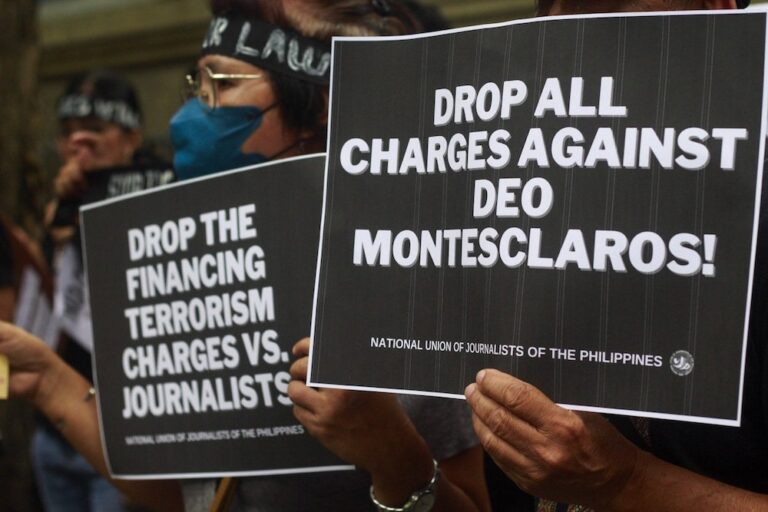Questioned about the possible motive behind an attack on a radio station other than theft, the station manager said it could be their stance against illegal gambling in Digos City, Philippines, in which local politicians and some police officials are allegedly involved.
Unidentified men stole a radio transmitter and other equipment in Digos City, wounding the radio station’s caretaker in the process, on 8 September 2013. Days later, on 11 September, a broadcaster from another radio station received a death threat sent via a commercial courier.
Digos City in the province of Davao del Sur is some 1,500 kilometers south of Manila.
MUEWS 97.5 FM station manager Arvin Malaza told CMFR on 24 September 2013 that he was at the radio station airing coverage of Digos’s 13th cityhood anniversary when the transmitter house was taken over by armed men.
The transmitter house was in Barangay (village) Soong, some seven kilometers from where the radio station is in downtown Digos City.
Roy Veronas, who had been caretaker of the transmitter for only six months, was shot twice and wounded in the right arm. He escaped the armed men, getting bruised in the process, and was brought to hospital. He said he would no longer work for the station.
The transmitter and other equipment, estimated to be worth PHP900,000 (some USD21,000), were missing after the incident.
“We had a back up (weaker) transmitter but it’s wonky. We lost about 50 percent of our normal coverage area,” Malaza said. “The stolen transmitter and equipment had a password and was registered. It can’t be taken apart and resold.”
Asked about the possible motive behind the attack other than theft, Malaza said it could be their station’s stance against illegal gambling in the city, in which local politicians and some police officials are allegedly involved.
Five days later, Boss Radio 99.1 FM news director for public affairs Ruby Simene received a package sent to her radio station’s address via commercial courier on Wednesday morning, 11 September. The package contained a .22 caliber magnum bullet and a note that said “Isang bala ka lang” (“It only takes one bullet”).
Simene immediately reported the incident to the police. The package indicated that the sender was a certain Lemuel Torres, but Simene said they checked with voters’ registration records and concluded that the name was bogus. They went to the local branch of the commercial courier from where the threatening package was dropped off, but found no footage of the sender from the CCTV cameras.
“That was the first time I had ever received a death threat,” Simene told CMFR on 24 September 2013. She started working for radio in 1989 and currently hosts a developmental and information program called …Boss Balita Ug Uban Pa (Boss News Etc.).
Simene mentioned a possible motive but asked not to include it in this report as she had “no evidence” to support her speculation.
A Philippine Daily Inquirer report last 17 September said local journalists in Digos City doubt that the police take the threats against media workers seriously.
“At an informal meeting outside the city police office here . . . (local journalists) cited the case of a colleague whom the police accused of ‘imagining threats to his life,'” the report said.
Three journalists have already been killed in Digos City since 1986. Two worked in radio. Mt. Apo Current and Kastigador publisher and editorial assistant Nestor Bedolido was killed in the city on 19 June 2010.
Hackers attack Manila broadsheet’s website
In a separate incident, a Manila broadsheet newspaper’s website almost shut down due to a barrage of bogus page-requests, in a “distributed denial of service” (DDoS) attack on 13 September. The attackers also exploited vulnerabilities of the news website’s content management system (WordPress), to redirect requests for news reports and opinion articles to a porn site, which resulted in Google and Facebook’s marking the web-pages as malicious spam and banning the web-pages from being shared.
Writers for the broadsheet pointed out that the “cyber-attack” happened the day after an opinion column critical of the Philippine president was published. A presidential spokesperson denied that the President’s communication team was behind the attack.
Manila Standard Today (MST) online editor Christian Cardiente said the cyber-attacks that started on Friday, 13 September, were not the first the site had experienced, but were more intense.
“Our site was bombarded with huge request packets which caused the server (central processing unit) resources to be utilized to the brim of shutting down – by as much as 98 percent,” Cardiente said in an e-mail to CMFR last 27 September. “The attackers wanted to simply shut us down.”
Aside from the DDoS attack, the attackers also targeted the site’s social media sharing function. “The hacker used the “addthis” exploit in WordPress and it evidently wanted the sharing features of (Facebook) disabled,” Cardiente said. “All 16 September articles were inaccessible and could not be shared over Facebook.”
Although the attacks were still ongoing at the time of writing [27 September], Cardiente said MST’s service provider was already able to mitigate the worst of it.
MST reporter Christina Herrera said the cyber-attack intensified when the newspaper published former senator Francisco Tatad’s op-ed articles critical of President Benigno Aquino III and the administration’s allies.
“Who else could have benefited from the attack?” Herrera asked CMFR in a phone interview on 20 September.
On 16 September, when the cyber-attack prevented Facebook sharing of all articles on the MST website, the newspaper published Tatad’s op-ed, ‘Napoles had lunch at Palace before she surrendered to PNoy’. Tatad alleged that the Malacañang Palace (the President’s official residence) staged the surrender of Janet Napoles, the woman at the center of a multi-billion peso scam involving the plunder of government funds.
On 17 September, another MST columnist, Jojo Robles, wrote that while it is easy to think that the attack was done by “anonymous people who are just, on their own, sympathetic to the Aquino administration . . . you can’t help but ask if this is another (Presidential) Communications Group operation.”
In an e-mail to CMFR on 26 September, deputy presidential spokesperson Abigail Valte denied the speculation.
“We are not in the habit of attacking the websites of any newspaper that publishes reports or columns that are critical of the administration,” Valte said.
“It is public knowledge that our own websites have also been the subject of cyber attacks from various groups. We have condemned actions like it and certainly do not tolerate such. Certainly, finger-pointing based on circumstantial evidence is counter-productive and helps no one,” the spokesperson added.



